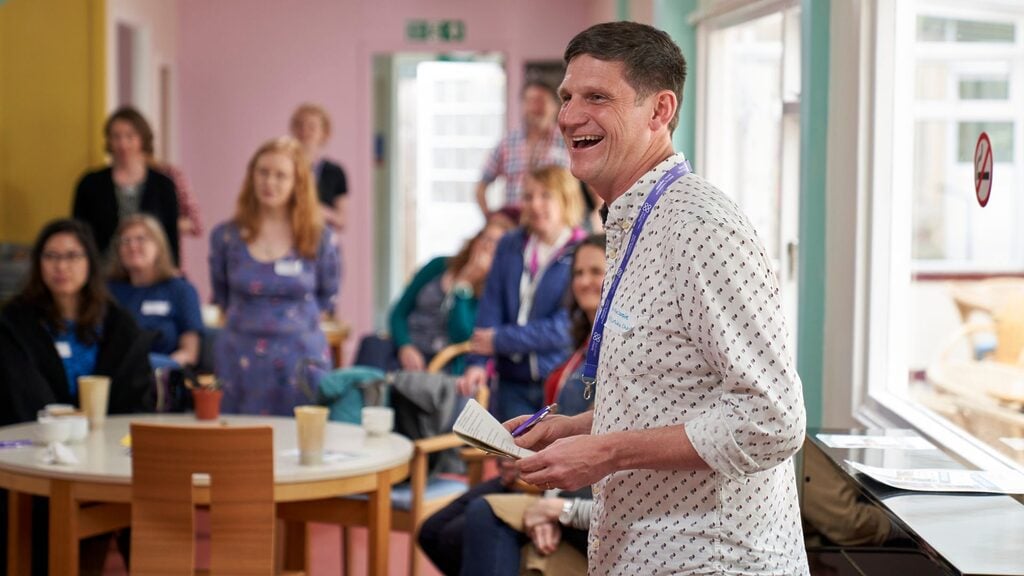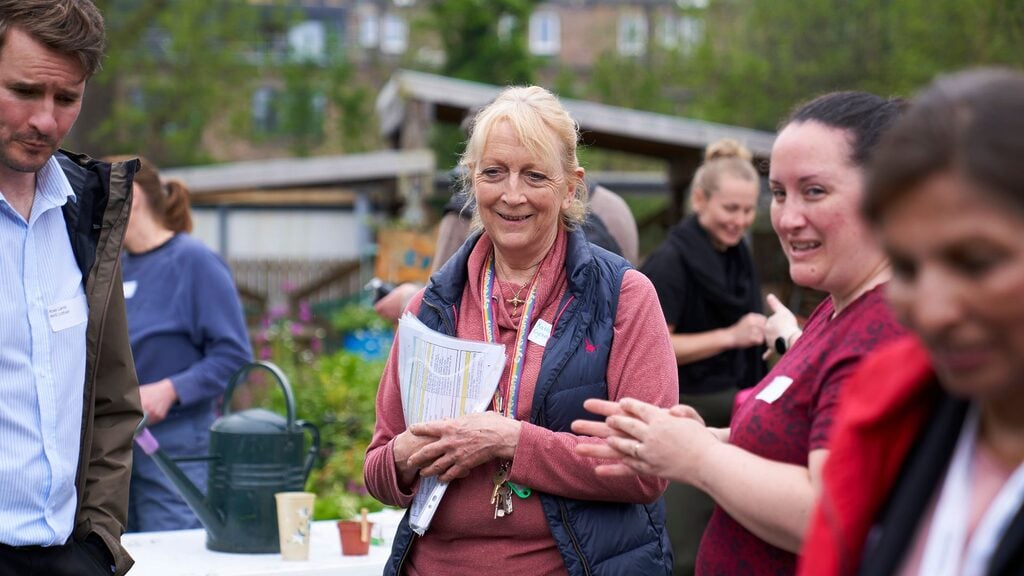Positive Health: Green Health and Tonic Arts Network Gathering 2025
Event Summary
Our Positive Health: Green Health and Tonic Arts Network Gathering 2025, held in-person at the Usher Building, University of Edinburgh, on 13th May, was a significant event focussing on the positive impact of arts and greenspace on health and the evidence supporting it. It brought together professionals and enthusiasts dedicated to integrating creativity and nature into healthcare and community wellbeing.
A central “Fishbowl Discussion on Evidence” highlighted three key pillars:
- Academic consensus confirmed the overwhelming positive health impact of nature and arts. For nature, meaningful engagement and sensory connection in greenspaces are crucial, with research showing benefits even before birth. For arts, the evidence is equally compelling, demonstrating its ability to reduce pain for patients in hospitals.
- Lived experience provided powerful personal stories and patient/staff feedback, validating these approaches in the real world, though also noting the need for equitable access to greenspaces as experiences can vary.
- Finally, expert opinion from healthcare professionals underscored the direct positive impact on patients, often from seemingly small interventions, creating significant ripple effects.
The gathering provided a good opportunity to network, allowing attendees to connect, share best practice, and build valuable relationships across the arts, health, and environmental sectors. Discussions encouraged leveraging these shared impacts to advance the greenspace and arts agenda, advocating for policy change, integrating initiatives into medical education, and strengthening collaborations with third-sector organisations. Overall, the event served as an important platform for sharing knowledge, building partnerships, and driving positive health initiatives through the powerful combination of creativity and nature.
Who Joined the Conversation?
The Positive Health Gathering brought together an incredible array of individuals and organisations, forming a dynamic network, passionate about connecting people with nature and art for better health. Here’s a glimpse of the expertise in the room:
- Leading Researchers and Academics: Representatives from the University of Edinburgh (including ACRC) and GroundsWell were present, grounding our discussions in cutting-edge academic evidence.
- Environmental and Greenspace Champions: Representatives from Archaeology Scotland, Cyrenians, Edinburgh and Lothians Greenspace Trust, RSPB, and Nature Rehabilitation Rangers shared their invaluable knowledge of natural environments.
- Arts and Creative Leaders: From Dance Base and Hospital Exhibitions Managers to Arts Project Managers, the creative force behind health-enhancing artistic interventions was well-represented.
- Dedicated Healthcare Professionals: Our event welcomed Social Workers, Clinical Psychologists, Occupational Therapists, Clinical Scientists, Geriatricians, and Young Adult Support Workers, demonstrating the direct impact of these initiatives on patient care.
- Community and Climate Activists: Passionate individuals from Edinburgh Communities Climate Action Network and Transition Edinburgh South (Scotland) Ltd, and West Lothian Climate Action Network highlighted the crucial role of community-led action.
- Strategic and Operational Managers: Key roles such as Staff Wellbeing Leads, Business Managers, Community Engagement Leads, and Development Workers provided insights into integrating and sustaining these programs.
This diverse mix truly underscored the collaborative spirit needed to advance the green health and arts agenda across Scotland!
What we discussed in the fish bowl
“What is the most compelling evidence demonstrating the positive impact of arts or greenspace on health and wellbeing?”
- Academic evidence – now reaching consensus: There is now overwhelming academic evidence from primary and systematic studies on the positive health impact of nature and arts based interventions.
- Meaningful moments are important: The greatest benefits come from how we engage with green spaces. It’s the sensory experiences and personal connections that make the real difference. (Read more )
- Benefits Begin Before Birth: A Belfast study showed that babies of mothers with greater access to green spaces were born with healthier birth weights, proving the effects start early. (Read more )
- Creativity and Colour Heal: In clinical settings, the presence of art and colour can improve patient outcomes by reducing the sensation of pain and the need for medication.
- Lived experience: Seeing is believing: Personal stories bring depth and humanity to the data.
- Individual Testimony is Powerful: Personal accounts of how nature and the arts have positively affected individuals and families provide powerful, relatable evidence that contextualises research. (Read more )
- Positive Feedback Validates: Case Study: NHS Lothian Staff Choir A partnership with Scottish Opera showed that choir participation significantly improved staff members’ mental & physical wellbeing, boosted confidence, and fostered connection. (Read more )
- Not All Green Space is Equal: The quality of a green space is critical. Poorly maintained or inaccessible spaces can sometimes decrease wellbeing and worsen health inequalities.
- Expert opinion – Insights form the frontline: Health professional who work with a wide range of people on a daily basis see the impact of this with their own eyes.
- Professionals Witness the Benefits: When clinical staff use nature and art-based activities in their practice, they see the positive impact on patients firsthand. This direct experience is compelling evidence for peers. (Read more )
- Small Changes, Big Ripples: Improved personal outcomes—like better coping skills for work, newfound confidence, and new social connections—can create a positive ripple effect throughout a person’s life.
- Counting the Cost/Benefit: Institutions like the NHS and Scottish Government need to see the financial case. Demonstrating how arts and green space can shorten hospital stays (even by one day) shows a clear cost benefit.
Moving forward – making it mainstream
- Stacking the layers of evidence: For this work evidence obtained from a properly designed randomised controlled trials is unlikely to be available therefore to make a compelling case for policy and resource support we need to stack the layers of evidence we have.
- Integration into future training: These impacts needs to be shared with institutions like medical schools so that future practitioners can support the health and wellbeing of their patients with these initiatives and also use to support their own wellbeing and potential burnout.
Shared resources and next steps
A key outcome of the gathering was the identification and sharing of valuable resources to help drive the positive health agenda forward. Whether you’re seeking robust evidence or practical tools for engagement, these resources can be incredibly helpful:
Trusted Research and Case Studies
Our discussions highlighted the importance of both academic rigor and real-world impact. Here are some trusted sources for research and compelling case studies:
- Nature Connectedness Research Group (University of Derby): This group focuses on strengthening the human-nature relationship for mutual well-being and conservation.
- The NHS Forest: Offers an extensive database of evidence and resources covering all aspects of green space and health.
- NHS Lothian Charity Impact Reports: Our collection of impact reports provides specific examples and findings from our own arts and green health initiatives.
Recommended Practical Resources
Looking to get more hands-on or involve your community? These organisations and citizen science projects offer fantastic opportunities:
- Trellis Scotland: A network supporting therapeutic gardening and horticulture.
- RSPB: Dedicated to bird and wildlife conservation, offering many ways to get involved with nature.
- Woodland Trust: The UK’s largest woodland conservation charity, working to protect and restore native woodlands.
- Merlin App: A free bird identification app by Cornell Lab of Ornithology (available on iOS and Android).
- Zooniverse: A global platform for citizen science projects, allowing anyone to contribute to real research.
- BTO (British Trust for Ornithology) Garden BirdWatch: A citizen science project where you can record birds in your garden.
Find out more about previous events
Ian Mackenzie, Green Health Programme Manager at NHS Lothian Charity, shares his reflections and key takeaways from last year’s event..


Join our network
Our network events are a great way to:
– Meet other people who are passionate about greenspace in Lothian and share best practice and build your network.
– Get first-hand experience of the activities offered through our Green Health programme that help improve the wellbeing of both patients and staff.
– Support your personal and professional development through reflective practice and participatory learning.